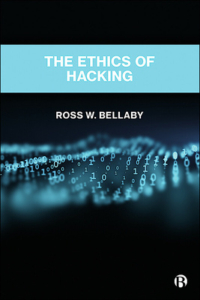Over the last two decades political hackers, like the infamous Anonymous collective, have demonstrated both their digital power and their willingness to use political violence to further their own agenda.
During this time, they have shutdown government websites across the globe; hacked Amazon, PayPal and Mastercard, costing $5.5 million in damages; aided in the Arab Spring revolutions by enabling the secure communication between revolutionaries; released private corporate information; and attacked media companies over anti-piracy efforts. Most recently, they have declared war on the Russian Federation following the invasion of Ukraine, releasing military information and hijacking state-owned media.
Such actions can be seen as nothing more than the acts of uncontrollable vigilantes, who are criticised and automatically denounced for acting outside the state’s official judicial or political systems as they take the law into their own hands. Indeed, they seem to attack systems and people through cyberspace in order to fulfill their own chaotic agenda, wielding significant individual and personal power, with no oversight, protected by a cloak of anonymity that only serves to further empower and embolden them.
In practice, however, many of their causes – targeting terrorist groups, fighting for LGBTQ+ rights and protecting people’s freedom of expression, autonomy and privacy – are intuitively good things to fight for. They have empowered those without access to the Internet in authoritarian regimes by sharing censor-circumventing technology, including facilitating protests and carrying out direct action against the Tunisian, Egyptian and Syrian governments when their officials limited people’s access to online infrastructure. They have supported protests against US police brutality, with Anonymous cyber-attacking police institutions after they shutdown protest movements sparked by the shooting of Charles Hill in San Francisco, Michael Brown in Ferguson, and 12-year-old Temir Rice in Cleveland. They also carried out hacks against the Nigerian and Ugandan governments after they announced homophobic legislation that would result in the arrest and detention for 14 years of members of the LGBTQ+ community.
Political hackers have thus developed a clear and explicitly articulated political ethos that prioritises protecting people from harm and furthers the value that cyberspace and the Internet can play in people’s lives. They have been seen to act to protect people – including from the state – when no other actors are able or willing to intervene. In addition to this, the evolving political hacker community has developed its own culture, internal checks and balances and an extensive set of communication and reflective practices that occur under the surface. Together, this has prompted the development of a politically astute and self-regulating hive-mind collective.
This does not mean, however, that political hackers should be let loose on the world without articulating an explicit set of justifications. Before anyone wields power of any type, they must think through and reflect in line with a clear set of ethically justified principles. This means understanding what is the ethical impetus for hacking, and what sort of political violence it can justify. By understanding this ethical core, hackers can unpack why they are acting as they are, guiding them to fulfil their own ethical agenda, while also signposting to society the ethical value in their actions.
The core of this ethical value of political hacking is drawn from the role it plays in protecting the political community and its members from harm as a form of self-defence. Indeed, one of the most fundamental and strongly held rights is the right to self-defence. This can be extended to another person to act on one’s behalf as well as justifying the damage inflicted on those who threaten agents who would cause someone harm. Importantly, this right is not just limited to protecting people from imminent death, but can be seen as the need to protect all our core vital interests, including the value people put in maintaining their autonomy, privacy and liberty. Depending which of these vital interests is threatened, the level and type of justified political violence used as self-defence can vary. Moreover, the right to be defended appropriately from harm is more important than waiting for state actors to offer protection. When the state fails to protect people from harm, or is itself the source of the harm, political hackers can step in and protect people, even if that act of protection causes the threatening agent harm. Just because hackers are outside the state this does not automatically discount them.
This also means that societies and their political representatives need to update their approach to political hackers. Ethical political hackers can act like a canary in the mine to a wider political problem or issue, because hacking is both a result of the lack of true political engagement opportunities, as well as a remedy that is actively restricted. Rather than inspiring change, political hackers are often met with an excessively aggressive legal response that reflects and entrenches an existing power asymmetry within society and limits the opportunity for hackers to exert their socially reforming power. It is vital to understand better the ethical value that hackers can play in society, and judge them for their use of cyberspace to protect people from harm, taking note of the underlying political agenda.
Ross W. Bellaby is Senior Lecturer in Security Studies in the Department of Politics and International Relations at the University of Sheffield.
 The Ethics of Hacking By Ross W. Bellaby is available on the Bristol University Press website. Order here for £24.99.
The Ethics of Hacking By Ross W. Bellaby is available on the Bristol University Press website. Order here for £24.99.
Bristol University Press/Policy Press newsletter subscribers receive a 25% discount – sign up here.
Follow Transforming Society so we can let you know when new articles publish.
The views and opinions expressed on this blog site are solely those of the original blog post authors and other contributors. These views and opinions do not necessarily represent those of the Policy Press and/or any/all contributors to this site.
Image: Jernej Furman via Flickr


